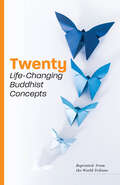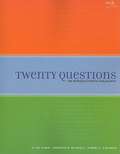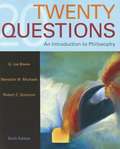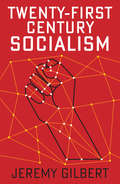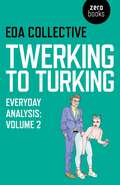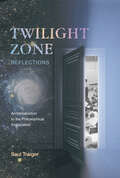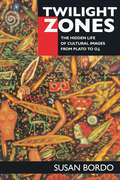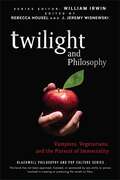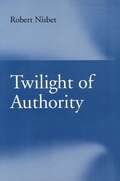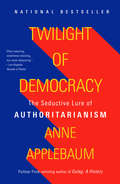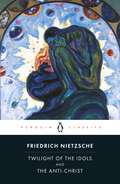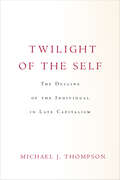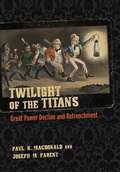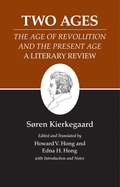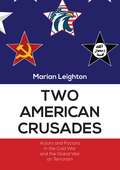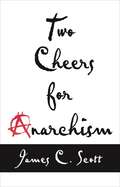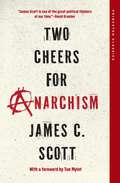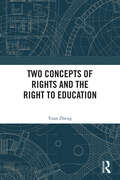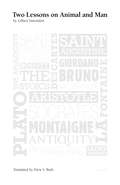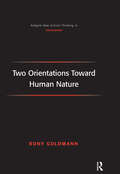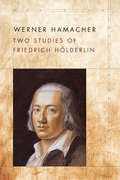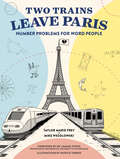- Table View
- List View
Twenty Life-Changing Buddhist Concepts
by World TribuneEncountering Nichiren Buddhism can change your life. This ancient philosophy, practiced by millions around the world today, can help you see your problems in new ways, find wisdom and courage, and discover the power of your own life. These twenty simple yet profound concepts will help get you started.
Twenty Questions: An Introduction To Philosophy
by Meredith W. Michaels G. Lee Bowie Robert C. SolomonHow should I make (and spend) money? What gives my life meaning? Should I be afraid of death? Philosophical questions such as these--timely, personal, and relevant to daily life--are explored in the best-selling TWENTY QUESTIONS. Through an exploration of classical and contemporary approaches to these problems in philosophy, literature, and beyond, TWENTY QUESTIONS provides a comprehensive and engaging introduction to philosophical reasoning.
Twenty Questions: An Introduction to Philosophy (6th edition)
by Meredith W. Michaels G. Lee Bowie Robert C. SolomonUsing a series of questions on a variety of topics, this extended collection of readings for undergraduates, with contributors ranging from those of Kant to Plato, Descartes, Berkeley, Chuang-Tzu, Sartre, the Koran, the Bible and Joseph Campbell, the editors cover the basics including religion and the meaning of life, the interactions of science, mind and nature, thinking and knowing, personhood, living a good life, and justice and responsibility. Questions include "Why shouldn't I be selfish?" "Am I free to choose what I do?" "Does religion give my life meaning" and "What is the meaning of death?" Each question includes a summary and commentary and a series of short readings. The text for this edition has been updated to include material on terrorism, violence, cloning, and personal identity.
Twenty-First Century Socialism (Radical Futures)
by Jeremy GilbertWhat causes climate change, social breakdown, rampant inequality and the creeping spread of ubiquitous surveillance? Capitalism. What is the only alternative to capitalism? Socialism. Socialism cannot, however, remain static if it is going to save civilisation from these catastrophes. In this urgent manifesto for a 21st century left, Jeremy Gilbert shows that we need a revitalised socialist politics that learns from the past to adapt to contemporary challenges. He argues that socialism must overcome its industrial origins and give priority to an environmental agenda. In an age of global networks, digital technology and instant communication, central government diktat and restrictions on free speech and movement must be jettisoned. We need to control the economy rather than let it control us - but we must do this by empowering workers, citizens and communities to run their world their way. It’s time to take back the wealth, the services and the platforms that our own energy has built. In the digital age, it’s time for a new socialism.
Twerking to Turking: Everyday Analysis
by EDA CollectiveIn this follow-up to the first volume of Everyday Analysis articles, Why are Animals Funny?, the EDA Collective tracks through an ABC of modern phenomena ordered by analytic theme, widely ranging from Advertising to Language, Sport to Education, Film and TV to Work and Play, and Politics to Comic Universes. Punctuating these phenomenal pieces are illustrations from a range of artists and cartoonists, including Martin Rowson of the London Guardian.
Twilight Zone Reflections: An Introduction to the Philosophical Imagination
by Saul TraigerTwilight Zone Reflections is the first book of its kind to explore the entirety of The Twilight Zone (1959–1964) as a series. It acts as both an introduction to the field of philosophy and as a complete guide to the philosophical issues illustrated throughout the original 1959-64 television series. Author Saul Traiger explores each of the 156 episodes, investigating the show’s themes in metaphysics, epistemology, moral and political philosophy, and other topics in a way that is accessible to both seasoned philosophers and those outside academia. Each short chapter dives into a single episode and concludes with helpful cross-references to other episodes that explore similar philosophical problems and subjects. For example, a reader may be interested in questions about the nature of the mind and whether machines can think. By referencing this book, they could easily discover the thematic connections between episodes like “I Sing the Body Electric” or “The Lateness of the Hour,” and learn how both episodes introduce the viewer to possible worlds that challenge us to consider whether our idea of the mind, and even our very personhood, extends beyond the human to robots and other artificial intelligences. Each chapter introduces fundamental philosophical questions such as these through the lens of The Twilight Zone and inspires additional exploration. Further readings are suggested for all episodes, making this volume indispensable to academics, students, and fans of the show. Each chapter is short and accessible, ensuring that this book is the perfect resource to accompany a complete series re-watch. The Twilight Zone considered questions that strike at the heart of philosophical inquiry, such as the nature of self, the existence of god, the possibility of an afterlife, the relationship between knowledge and mental illness, the nature of possibility, even the nature of imagination itself, and so much more. Traiger argues that each episode can serve as an entry point for philosophical reflection. Twilight Zone Reflections is a valuable reference for anyone interested in exploring a well-known slice of popular culture history that doubles as a vast store of philosophical ideas.
Twilight Zones: The Hidden Life of Cultural Images from Plato to O.J.
by Susan BordoConsidering everything from Nike ads, emaciated models, and surgically altered breasts to the culture wars and the O.J. Simpson trial, Susan Bordo deciphers the hidden life of cultural images and the impact they have on our lives. She builds on the provocative themes introduced in her acclaimed work Unbearable Weight—which explores the social and political underpinnings of women's obsession with bodily image—to offer a singularly readable and perceptive interpretation of our image-saturated culture. As it becomes increasingly difficult to distinguish between appearance and reality, she argues, we need to rehabilitate the notion that not all versions of reality are equally trustworthy. Bordo writes with deep compassion, unnerving honesty, and bracing intelligence. Looking to the body and bodily practices as a concrete arena where cultural fantasies and anxieties are played out, she examines the mystique and the reality of empowerment through cosmetic surgery. Her brilliant discussion of sexual harassment reflects on the Clarence Thomas/Anita Hill controversy as well as the film Disclosure. She suggests that sexuality, although one of the mediums of harassment, is not its essence, and she calls for the recasting of harassers as bullies rather than sex fiends. Bordo also challenges the continuing marginalization of feminist thought, in particular the failure to read feminist work as cultural criticism. Finally, in a powerful and moving essay called "Missing Kitchens"—written in collaboration with her two sisters—Bordo explores notions of bodies, place, and space through a recreation of the topographies of her childhood. Throughout these essays, Bordo avoids dogma and easy caricature. Consistently, and on many levels, she demonstrates the profound relationship between our lives and our theories, our feelings and our thoughts.
Twilight and Philosophy: Vampires, Vegetarians, and the Pursuit of Immortality (The Blackwell Philosophy and Pop Culture Series #15)
by William IrwinThe first look at the philosophy behind Stephenie Meyer's bestselling Twilight series Bella and Edward, and their family and friends, have faced countless dangers and philosophical dilemmas in Stephenie Meyer's Twilight novels. This book is the first to explore them, drawing on the wisdom of philosophical heavyweights to answer essential questions such as: What do the struggles of "vegetarian" vampires who control their biological urge for human blood say about free will? Are vampires morally absolved if they kill only animals and not people? From a feminist perspective, is Edward a romantic hero or is he just a stalker? Is Jacob "better" for Bella than Edward? As absorbing as the Meyer novels themselves, Twilight and Philosophy: Gives you a new perspective on Twilight characters, storylines, and themes Helps you gain fresh insights into the Twilight novels and movies Features an irresistible combination of vampires, romance, and philosophy Twilight and Philosophy is a must-have companion for every Twilight fan, whether you're new to the series or have followed it since the beginning.
Twilight of Authority
by Robert Nisbet Robert C. PerrinWe had thought, or our forefathers had, that modern liberal democracy would be spared the kind of erosion and decay that both Plato and Aristotle declared endemic in all forms of state. Now we are not so sure. " So wrote Robert Nisbet in the first edition of Twilight of Authority, published by Oxford University Press in 1975, shortly after the resignation of President Richard Nixon revealed what Nisbet called "only the most extreme and corrupt manifestation of a democratic royalism that has roots in several preceding administrations. " Nisbet argues that the political community in the West has broken down after two centuries of ascendancy. He believes that the West has entered "a twilight age" that will be characterized by political and cultural crises similar to those that preceded the fall of Rome. He foresees the displacement of traditional, liberal society by centralized, collectivized power--what he terms "the war society," driven by the rising power and expense of a hugely scaled military. "The centralization, and, increasingly, individualization of power is matched in the social and cultural spheres by a combined hedonism and egalitarianism, each in its own way a reflection of the destructive impact of power on the hierarchy that is native to the social bond," he writes. Nisbet offers no prophecy of inevitable decline; rather, he means to call attention to "the problem of finding the means of generating a social order within which the individual can live and derive a spirit of initiative. " Robert Nisbet (1913-1996) was renowned worldwide for his scholarship in the history and philosophy of social and political thought. He taught at Columbia, the University of California at Berkeley, Smith College, and the University of Bologna, and was the author of several major works, including Social Change and History and The Quest for Community.
Twilight of Democracy: The Seductive Lure of Authoritarianism
by Anne ApplebaumA Pulitzer Prize–winning historian explains, with electrifying clarity, why elites in democracies around the world are turning toward nationalism and authoritarianism.From the United States and Britain to continental Europe and beyond, liberal democracy is under siege, while authoritarianism is on the rise. In Twilight of Democracy, Anne Applebaum, an award-winning historian of Soviet atrocities who was one of the first American journalists to raise an alarm about antidemocratic trends in the West, explains the lure of nationalism and autocracy. In this captivating essay, she contends that political systems with radically simple beliefs are inherently appealing, especially when they benefit the loyal to the exclusion of everyone else.Despotic leaders do not rule alone; they rely on political allies, bureaucrats, and media figures to pave their way and support their rule. The authoritarian and nationalist parties that have arisen within modern democracies offer new paths to wealth or power for their adherents. Applebaum describes many of the new advocates of illiberalism in countries around the world, showing how they use conspiracy theory, political polarization, social media, and even nostalgia to change their societies.Elegantly written and urgently argued, Twilight of Democracy is a brilliant dissection of a world-shaking shift and a stirring glimpse of the road back to democratic values.
Twilight of Idols and Anti-Christ
by Friedrich NietzscheIn these two devastating late works, Nietzsche offers a powerful attack on the morality and the beliefs of his timeNietzsche's Twilight of the Idols is a 'grand declaration of war' on reason, psychology and theology, which combines highly charged personal attacks on his contemporaries (in particular Hegel, Kant and Schopenhauer) with a lightning tour of his own philosophy. It also paves the way for The Anti-Christ, Nietzsche's final assault on institutional Christianity, in which he identifies himself with the 'Dionysian' artist and confronts Christ: the only opponent he feels worthy of him.Translated by R. J. Hollingdale with an Introduction by Michael Tanner
Twilight of the Idols
by Friedrich Nietzsche Richard Polt Tracy StrongTwilight of the Idols presents a vivid, compressed overview of many of Nietzsche's mature ideas, including his attack on Plato's Socrates and on the Platonic legacy in Western philosophy and culture. Polt provides a trustworthy rendering of Nietzsche's text in contemporary American English, complete with notes prepared by the translator and Tracy Strong. An authoritative Introduction by Strong makes this an outstanding edition. Select Bibliography and Index.
Twilight of the Idols and The Antichrist
by Friedrich Nietzsche Thomas Common"Books for everybody are always malodorous books: the smell of petty people clings to them," scoffed Friedrich Nietzsche. These two works, Twilight of the Idols and The Antichrist, crowned the radical philosopher's career of writing books that are decidedly not for everyone. Written in 1888, while Nietzsche was at the height of his brilliance — but shortly before the onset of the insanity that gripped him until his death in 1900 — they blaze with provocative, inflammatory rhetoric.Nietzsche's "grand declaration of war," Twilight of the Idols examines what we worship and why. Intended by the author as a general introduction to his philosophy, it assails "idols" of Western philosophy and culture (Socratic rationality and Christian morality among them) and sets the scene for The Antichrist. In addition to its full-scale attack on Christianity and Jesus Christ, The Antichrist denounces organized religion as a whole. H. L. Mencken declared that "it is, to many sensitive men, in the worst possible taste, but at bottom it is enormously apt and effective — on the surface, it is undoubtedly a good show." Students of philosophy, history, and German literature will find these works essential to an understanding of Nietzschean philosophy.
Twilight of the Idols: Or How To Philosophize With A Hammer (Dover Thrift Editions)
by Friedrich Nietzsche"Twilight of the Idols means that the old truth is on its last legs," declared Friedrich Nietzsche in this 1889 polemic. Forceful in his language and profound in his message, the philosopher delivered the nineteenth century's most devastating attack on Christianity. Intended by Nietzsche as a general introduction to his philosophy, it assails the "idols" of Western philosophy and culture, including the concepts of Socratic rationality and Christian morality. Written while Nietzsche was at the peak of his powers, less than a year before the onset of the insanity that gripped him until his death in 1900, this work's proximity to the end of the author's career renders it a distinctive portrait from his later period. The source of the famous dictum, "Whatever does not kill me makes me stronger," it blazes with provocative, inflammatory rhetoric that challenges readers to reexamine what they worship and why.
Twilight of the Self: The Decline of the Individual in Late Capitalism
by Michael ThompsonIn this new work, political theorist Michael J. Thompson argues that modern societies are witnessing a decline in one of the core building blocks of modernity: the autonomous self. Far from being an illusion of the Enlightenment, Thompson contends that the individual is a defining feature of the project to build a modern democratic culture and polity. One of the central reasons for its demise in recent decades has been the emergence of what he calls the "cybernetic society," a cohesive totalization of the social logics of the institutional spheres of economy, culture and polity. These logics have been progressively defined by the imperatives of economic growth and technical-administrative management of labor and consumption, routinizing patterns of life, practices, and consciousness throughout the culture. Evolving out of the neoliberal transformation of economy and society since the 1980s, the cybernetic society has transformed how that the individual is articulated in contemporary society. Thompson examines the various pathologies of the self and consciousness that result from this form of socialization—such as hyper-reification, alienated moral cognition, false consciousness, and the withered ego—in new ways to demonstrate the extent of deformation of modern selfhood. Only with a more robust, more socially embedded concept of autonomy as critical agency can we begin to reconstruct the principles of democratic individuality and community.
Twilight of the Titans: Great Power Decline and Retrenchment (Cornell Studies in Security Affairs)
by Paul K. MacDonald Joseph M. ParentIn this bold new perspective on the United States–China power transition, Paul K. MacDonald and Joseph M. Parent examine all great power transitions since 1870. They find that declining and rising powers have strong incentives to moderate their behavior at moments when the hierarchy of great powers is shifting. How do great powers respond to decline? they ask. What options do great powers have to slow or reverse their descent?In Twilight of the Titans, MacDonald and Parent challenge claims that policymakers for great powers, unwilling to manage decline through moderation, will be pushed to extreme measures. Tough talk, intimidation, provocation, and preventive war, they write, are not the only alternatives to defeat. Surprisingly, retrenchment tends not to make declining states tempting prey for other states nor does it promote domestic dysfunction. What retrenchment does encourage is resurrection. Only states that retrench have recovered their former position.MacDonald and Parent show how declining states tend to behave, what policy options they have to choose from, how rising states respond to decline, and what conditions reward which strategies. Using case studies that include Great Britain in 1872 and 1908, Russia in 1888 and 1903, and France in 1893 and 1924, Twilight of the Titans offers clear evidence that declining powers have a wide array of options at their disposal and offers guidance on how to use the right tools at the right time. The result is a comprehensive rethinking of power transition and hegemonic war theories and a different approach to the policy problems that declining states face. What matters most, the authors write, is the strategic choices made by the great powers.
Two Ages: The Age of Revolution and the Present Age
by Howard V. Hong Edna H. Hong Søren KierkegaardAfter deciding to terminate his authorship with the pseudonymous Concluding Unscientific Postscript, Kierkegaard composed reviews as a means of writing without being an author. Two Ages, here presented in a definitive English text, is simultaneously a review and a book in its own right. In it, Kierkegaard comments on the anonymously published Danish novel Two Ages, which contrasts the mentality of the age of the French Revolution with that of the subsequent epoch of rationalism. Kierkegaard commends the author's shrewdness, and his critique builds on the novel's view of the two generations. With keen prophetic insight, Kierkegaard foresees the birth of an impersonal cultural wasteland, in which the individual will either be depersonalized or obliged to find an existence rooted in "equality before God and equality with all men. " This edition, like all in the series, contains substantial supplementary material, including a historical introduction, entries from Kierkegaard's journals and papers, and the preface and conclusion of the original novel.
Two American Crusades: Actors and Factors in the Cold War and the Global War on Terrorism
by Marian LeightonHere is the first in-depth analysis and comparison of U.S. policy in two seminal conflicts of our recent history: the Cold War and the Global War on Terrorism. Unlike previous publications, which deal with each conflict separately, Two American Crusades t
Two Cheers for Anarchism: Six Easy Pieces on Autonomy, Dignity, and Meaningful Work and Play
by James C. ScottA spirited defense of the anarchist approach to lifeJames Scott taught us what's wrong with seeing like a state. Now, in his most accessible and personal book to date, the acclaimed social scientist makes the case for seeing like an anarchist. Inspired by the core anarchist faith in the possibilities of voluntary cooperation without hierarchy, Two Cheers for Anarchism is an engaging, high-spirited, and often very funny defense of an anarchist way of seeing—one that provides a unique and powerful perspective on everything from everyday social and political interactions to mass protests and revolutions. Through a wide-ranging series of memorable anecdotes and examples, the book describes an anarchist sensibility that celebrates the local knowledge, common sense, and creativity of ordinary people. The result is a kind of handbook on constructive anarchism that challenges us to radically reconsider the value of hierarchy in public and private life, from schools and workplaces to retirement homes and government itself.Beginning with what Scott calls "the law of anarchist calisthenics," an argument for law-breaking inspired by an East German pedestrian crossing, each chapter opens with a story that captures an essential anarchist truth. In the course of telling these stories, Scott touches on a wide variety of subjects: public disorder and riots, desertion, poaching, vernacular knowledge, assembly-line production, globalization, the petty bourgeoisie, school testing, playgrounds, and the practice of historical explanation.Far from a dogmatic manifesto, Two Cheers for Anarchism celebrates the anarchist confidence in the inventiveness and judgment of people who are free to exercise their creative and moral capacities.
Two Cheers for Anarchism: Six Easy Pieces on Autonomy, Dignity, and Meaningful Work and Play (Princeton Classics)
by James C. Scott&“One of the world&’s most widely read social scientists&” (New York Times) offers his most personal and accessible book—a celebration of how ordinary people can resist oppression and injusticeJames Scott taught us what's wrong with seeing like a state. Now, in his most accessible and personal book to date, the acclaimed social scientist makes the case for seeing like an anarchist. Inspired by the core anarchist faith in the possibilities of voluntary cooperation without hierarchy, Two Cheers for Anarchism is an engaging, high-spirited, and often very funny defense of an anarchist way of seeing—one that provides a unique and powerful perspective on everything from everyday social and political interactions to mass protests and revolutions. Through a wide-ranging series of memorable anecdotes and examples, the book describes an anarchist sensibility that celebrates the local knowledge, common sense, and creativity of ordinary people. The result is a kind of handbook on constructive anarchism that challenges us to radically reconsider the value of hierarchy in public and private life, from schools and workplaces to retirement homes and government itself.Beginning with what Scott calls "the law of anarchist calisthenics," an argument for law-breaking inspired by an East German pedestrian crossing, each chapter opens with a story that captures an essential anarchist truth. In the course of telling these stories, Scott touches on a wide variety of subjects: public disorder and riots, desertion, poaching, vernacular knowledge, assembly-line production, globalization, the petty bourgeoisie, school testing, playgrounds, and the practice of historical explanation.Far from a dogmatic manifesto, Two Cheers for Anarchism celebrates the anarchist confidence in the inventiveness and judgment of people who are free to exercise their creative and moral capacities.
Two Concepts of Rights and the Right to Education
by Yuan ZhengMost rights theories hold that the same act of a person or group cannot be driven by both a right and a duty. This book introduces the theory of initial rights and derived rights, demonstrating that an act is often the result of both. The key idea is that individuals and collectives have the right to fulfill their duty. However, general rights, those people are born with, do not originate from any duty, meaning their choices are not dictated by duties. As a result, access to education is a right, not a duty.The theory of initial and derived rights can extend beyond education to explain broader social dynamics, such as the relationship between government and citizens. This book applies the theory to various contexts, including children’s education, civic and moral education, school– student relationships, and teacher– student interactions. It explores how absolute rights relate to general rights, how the right to education connects to the right to establish private schools, and how opportunities for choice are linked to rights. While this is an abstract theoretical study, it offers practical insights for schools and teachers.The book will be of interest to researchers and students of rights theories and the philosophy of education, as well as educators.
Two Lessons on Animal and Man (Univocal)
by Gilbert SimondonSimondon is a secret password among certain discussions within philosophy today. As a philosopher of technology, Simondon&’s work has a place at the forefront of current thinking in media, technology, psychology, and philosophy with complex accounts of man&’s relationship to technology and the realm that continues to form itself via this tension between man and his technical universe. In this introduction to Simondon&’s oeuvre, the reader has access to the grounding of one of the most fundamental and critical questions that has been the focus of philosophy for millennia: the relationship between man and animal.
Two Orientations Toward Human Nature (Ashgate New Critical Thinking in Philosophy)
by Rony GuldmannOur culture entertains a schizophrenic attitude towards human nature. On the one hand, egoism is held to be our most powerful motive, playing a crucial cultural role by explaining the appeal of capitalism and providing a foundation for individualism. By contrast much of the continental intellectual tradition speaks of wholeness and alienation, seeing human nature not as self-interested but as herd-like. Guldmann argues that this schism reflects two diverging conceptions of human agency, and that the attempt to locate human nature somewhere along a continuum between egoism and altruism presupposes a misleading picture of what it is to be a human being. The second, ’continental’ tradition is more illuminating because it recognizes that human beings are necessarily committed to some conception of the ultimately significant.
Two Studies of Friedrich Hölderlin (Meridian: Crossing Aesthetics)
by Werner HamacherTwo Studies of Friedrich Hölderlin shows how the poet enacts a radical theory of meaning that culminates in a unique and still groundbreaking concept of revolution, one that begins with a revolutionary understanding of language. The product of an intense engagement with both Walter Benjamin and Jacques Derrida, the book presents Werner Hamacher's major attempts at developing a critical practice commensurate with the immensity of Hölderlin's late writings. These essays offer an incisive and innovative combination of critical theory and deconstruction while also identifying where influential critics like Heidegger fail to do justice to the poet's astonishing radicality. Readers will not only come away with a new appreciation of Hölderlin's poetic and political-theoretical achievements but will also discover the motivating force behind Hamacher's own achievements as a literary scholar and political theorist. An introduction by Julia Ng and an afterword by Peter Fenves provide further information about these studies and the academic and theoretical context in which they were composed.
Two Trains Leave Paris: Number Problems for Word People
by Taylor Frey Mike WesolowskiEntertaining word problems that let verbal types master the language of math!Math is a universal language, but it’s also the least understood and most undervalued subject taught in school. Two Trains Leave Paris: Number Problems for Word People offers an opportunity to experience math like never before. You must use the Pythagorean Theorem to figure out how far apart two ex-lovers are when they simultaneously realize that they cannot live without each other. You must use addition (and logic) to explore the ridiculous (and patriarchal!) wage gap. Throughout six math-themed chapters, readers will follow a series of characters as they apply for jobs, fall in love, get abducted by aliens, and experience many of life’s other big and small moments, all of which are dictated by—you guessed it—math! With the help of humor, mathematical history, and how-to-solve sections, Two Trains Leave Paris asks readers to help its characters find growth in the most unexpected of places: word problems. And the answers are, of course, in the back.
